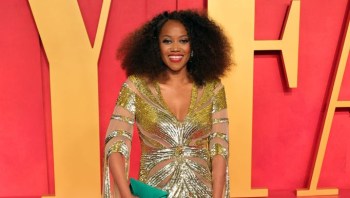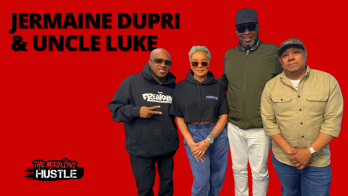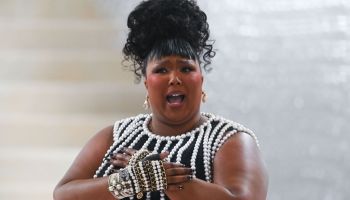Atlanta-based singer Janelle Monáe has been mentored by OutKast’s Big Boi, signed by Diddy, reps a tuxedo every day, and leads a fictional android army. In a world of Lady Gaga’s outrageous styling, where high-concept tours—and personalities, and music videos—are the norm, none of this necessarily makes her unusual. What does, however, is her Large HadronCollider approach to musical genres. Her new album, The ArchAndroid—debuting in stores today—is a place where styles collide with great force, and to great effect. Over the next few days, Brentin Mock, a journalist at the New Orleans news non-profitThe Lens, Atlantic correspondent Alyssa Rosenberg, and Shani O. Hilton, a freelance writer who blogs at PostBourgie will talk about The ArchAndroid, and about Monáe. Mock started off the conversation, and Rosenberg continues it here:
“Our movement will not be stopped. Not this time. We know what we’re fighting for.” It sounds like the kind of thing a politician would say, but instead, it’s one of the missives that Janelle Monáe sent out on her Twitter feed to a growing legion of ferociously dedicated followers. The reason I count myself among them, a happy member of Monáe’s android army, is that despite the hype, both self-generated and swirling around her, The ArchAndroid really is part of a movement to erode the boundaries between hip-hop, pop, and rock.
Brentin hears Toni Morrisson, Mad Max, Prince, and Parliament in The ArchAndroid, but for me, part of the album’s beauty is that I heard an entirely different set of triggers in it. “Sir Greendown,” a dreamy track from the album’s first half could stand in for the arrangement of “Sigh No More, Ladies” in Kenneth Branagh’s 1993 adaptation of Much Ado About Nothing. “Come Alive” has both “Thriller’s” catchy hooks and the goofiness of “Monster Mash.” And “57821” is a tender love song, as lovely and fragile as anything by Simon & Garfunkle, but shot through with the promises of terrible violence and miraculous transformation.
I can’t answer Brentin’s question about why Atlanta has such a sterling track record as a generator of visionary artists. But it does makes sense to me that a second generation of artists based in the city would take the self-confidence and eccentricity of artists like OutKast and Cee-Lo Green and demand to be recognized as cross-genre talents by the listening mainstream. Monáe may only be ten years younger than Antwan Patton, the member of OutKast who discovered and mentored her, and who has collaborated on a number of tracks with her, and 11 years younger than Green, but she really does feel to me like an entirely different generation.
Part of it is her highly realized, mature aesthetic, a tuxedo she considers a uniform paired with science-fiction imagery and themes: her music is rooted even farther in the future than the time she’s actually operating in. And part of that sense comes from the confidence Monáe and her Atlanta contemporary, the rapper B.o.B., whose first album, B.o.B. Presents: The Adventures of Bobby Ray, dropped just weeks before The ArchAndroid, both project. Entertainment Weekly‘s review of The Adventures of Bobby Ray noted that B.o.B. “wants to be a rock star,” as if it were an unusual ambition for a rapper. He and Monáe both act as if it isn’t.
They aren’t the first, of course. Rap and other popular music forms have always been in conversation. Run-DMC helped introduce hip-hop to rock-oriented audiences through a collaborative remake of Aerosmith’s “Walk This Way.” Earlier this year, before he reported to prison, Lil Wayne released a critically panned rock album in an attempt to conquer a second genre. It’s become standard for pop songs to include a hip-hop guest verse, and singers like Keri Hilson have even staged conversations between pop, hip-hop and R&B, as she did in “Knock You Down,” where she pitted Kanye West and Ne-Yo romantically and stylistically against each other in the quest for her affections.
B.o.B. did something similar on “Airplanes, Part II,” juxtaposing his own rapping with Eminem’s, and setting up both against soaring choruses by Paramore’s Hayley Williams, the Tennessee rock band. But he also raps and sings his own choruses on “Don’t Let Me Fall” demonstrating, yet again, something that ought to be abundantly evident by now: that a crisp, precise, articulate flow and singing aren’t mutually exclusive skill sets.
Monae displays the same range, whether she’s rapping on “Dance or Die,” or soaring on “Cold War.” She treats guests like the rapper and slam poet Saul Williams (himself no stranger to cross-genre collaboration: he worked on a 2007 album with industrial legend Trent Reznor) and indie pop band Of Montreal as if they’re a natural continuum. Which, of course, they are. The great gift of albums like The ArchAndroid is that they serve as a reminder that it’s all just popular music. And the true stars shine all the way up and down the spectrum.













